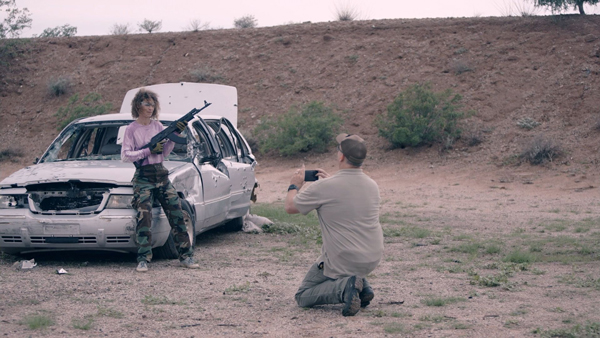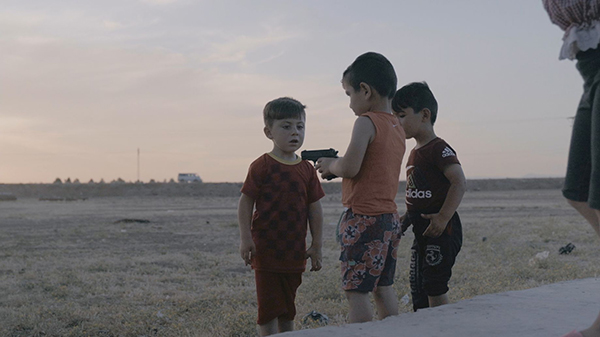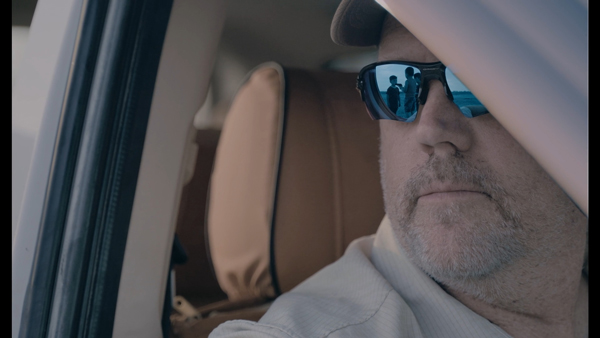[The FIPRESCI Warsaw Critics Project is a training workshop for young critics and film journalists within the Warsaw Film Festival. This interview is co-authored by Dalesia Cozorici and Marija Lukarevska.]
The Danger Zone project consumed nearly a decade of the life of Lithuanian-born, Polish director Vita Maria Drygas. It explores the niche but growing business of war tourism, reflecting on how society handles the aftermath of contemporary conflicts and suffering across the globe. In our sit down, Drygas was joined by Andrew Drury, a man with decades of experience in war tourism and one of the central figures in the film. Drygas’s style involves a profound curiosity for the territorial spaces that she doesn’t merely map out but allows to be channeled by the people themselves. Together with Drury, she was happy to dig deeper into the synergy of their work, the relationships with her subjects, her unique approach to filmmaking and the impact it has on the lives of the people on the screen.

Q: Let’s start with the basics. Vita, you discovered war tourism when you saw an advertisement while you were filming your previous movie Piano (2015). Even back then, you were interested in documenting conflict regions and placing a strong emphasis on the locals, their concerns, and the uncertainties that were forming. Why did you decide to make this film, which revolves around a not-so-well-known concept of visiting spaces that challenge your ethical sensibilities?
Vita Maria Drygas: I make a documentary when I really feel the urge to do it. At the same time, I feel a huge responsibility for my characters. I never approach them with judgment. I came to Andrew with an open heart. I really wanted to understand him. So, our first real meeting when we started to film, was a conversation that lasted eight hours. Andrew always says: “Vita, you squeeze the lemon”. The base of Danger Zone is war tourism, but I really wanted to touch different layers and I wanted to show that any war is eating another war; like when Eleonora says to Somaya: “We are sorry that nobody talks anymore about Afghanistan.”
Q: Andrew, how did you first become a war tourist?
Andrew Drury: I have never seen myself as a war tourist. But I am. Or I was. Мy journey has changed, because I found it difficult to watch the images shown in the film. At the beginning, it was just an adventure holiday. Vita asked me to participate in her documentary and I didn’t want to do it. It’s not that I didn’t want to expose myself, since most people knew about me anyway…
Drygas: He’s a star in the UK.
Drury: Well, Piers Morgan, the English broadcaster, might not think I am, but the whole situation about the movie was difficult. I don’t really care what people think of me. The only people I have to please are my family, who I love very much. So I didn’t want to do the movie because I didn’t feel the need for it, but Vita wouldn’t let the subject go. And in the end, I just said: “Okay, let’s do it!”. And that’s what you saw. It took seven years to make the movie, but it only touches the surface. You see the topic of war, but truthfully, it’s a lot deeper than that and I hope you can see how deeply I care for the people in the country.
Q: Vita, what methods did you use while filming in war zones?
Drygas: You need to have a very small camera with high quality and very little equipment, because you need to be low-key. In war zones it is really important not to attract attention. Once, we were travelling to Syria and we had a lady with us who was supposed to be our guide, but she was actually sent by president Bashar al-Assad to watch what we are doing. We wanted to pretend we were tourists because we couldn’t come as a film crew. Unfortunately, she realized that wasn’t true and sent us to the Ministry of Censorship, which is serious business. They took our equipment, but luckily we were able to get it back. I could have ended up in prison.

Q: How did the multiple warzone locations affect the filming process?
Drury: It is difficult, but you never see any danger. You never see gunfire, you never see the frontline, because that’s not war. War is different and there are risks everywhere. When I was in Somalia, there was an ice-cream parlor that could be open only one day, because otherwise it would be blown up. My friend, the head of security, went to get an ice-cream and he was killed because the parlor was blown up. That is why it’s very important when you film, how you film and what you do. Also, you don’t want to disturb people’s lives, because you show up in their villages with a camera crew and you want to film their misery. It’s difficult.
Q: Andrew‘s reason for engaging in war tourism is much deeper than just looking for adrenaline, but that emotional story wasn’t included in the documentary. Vita, how do you decide what to include and what to leave out?
Drygas: Our first long conversation was about his brother whom he lost when he was 10. It was filmed and he was talking directly to the camera, But during the editing we were thinking about the construction of the movie, how to tell all these stories. We had many different versions of the movie, but at one point we decided that we didn’t want to have talking heads. We tried to include this story with a voice over, but it didn’t work. He can’t suddenly sit and say: “Oh, my brother died when I was 10“. You can’t see his eyes and his tears, and it all becomes shallow. We wanted to include this story in the film, so we tried ten versions where he spoke to the camera, but true emotions only come once. You can’t repeat it.
Q: Andrew, how do you think your journeys affect your family and how did you feel when you watched the documentary?
Drury: You probably think it’s very selfish for a person to leave his children at home knowing you might not come back. But I always make sure I’m coming back. It’s difficult to say goodbye to your children but it’s also difficult to say goodbye to those children I met. If I hadn’t done my journey I wouldn’t be able to help hundreds of other people. Sometimes in life we do things because we need to do them.
Drygas: Andrew, would you say that in our movie, I showed you in a shallow way?
Drury: No, not shallow. You showed me how I was.
Drygas: We are just joking now, but when Andrew saw the movie, he told me: “Oh my goodness, Vita, I was so irresponsible“. It is an amazing feeling for a director to see that your character is changing. Our first meeting was very different from the last meeting. We evolved.

Q: What changed you?
Drury: I went to Kirkuk, Iraq during the war with ISIS and I was excited to have an opportunity to go on the frontline. It was a very active frontline. The war was really bad. There was a big hole in the ground, with a sniper. There were snipers everywhere, but this one was pointed at one building all the time. I was there for two hours and I asked the guy: “Why do you keep it pointed all the time? The house is only 1500 meters away, it’s not far, you can see it from here”. And he told me it was his house, and he was using his sniper rifle to check whether his children or wife were still alive. That changes you.


